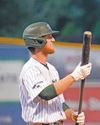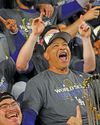
Paul Skenes threw 124 pitches on his way to a complete-game win in Louisiana State's regional opener. If you surveyed social media during the game, you might have thought LSU coach Jay Johnson and pitching coach Wes Johnson had taken a hacksaw to Skenes' elbow sometime during the ninth inning.
Skenes is universally viewed as the top pitching prospect in the 2023 draft. So what were Johnson and Johnson doing taking such a big risk by letting him work so deep in a game?
No MLB pitcher had thrown 124 pitches in a game this year. And only Miles Mikolas did it last year.
Case closed. The evidence is clear: LSU is playing with fire.
MLB teams have learned to never let a pitcher throw so many pitches, so why haven't colleges followed suit?
Actually, let's take a deeper look. I asked a biomechanist, a pro pitching coordinator and an MLB front office official how concerned they were about Skenes' outing. None of them was particularly worried. They noted that he was clearly stretched out, having worked 115-plus pitch outings multiple times in the weeks leading up to his 124pitch outing.
And they pointed out he was working on extra rest. Skenes had not pitched in eight days when he took the mound in the regional. He also was going to have eight days before he pitched again in LSU's super regional.
And the in-game markers of pitching fatigue, at least from what we have publicly, do not appear to have shown up. In the first three innings of his regional start, Skenes' fastball averaged 99.2 mph. In his final three innings it averaged 99.1. His velocity was unchanged.
LSU had additional information. Teams now look at extension and release points as more granular details to indicate when to pull a tiring pitcher. We don't have that info publicly, but Wes Johnson, the Twins' pitching coach before he came to LSU, did.
This story is from the {{IssueName}} edition of {{MagazineName}}.
Start your 7-day Magzter GOLD free trial to access thousands of curated premium stories, and 9,000+ magazines and newspapers.
Already a subscriber ? Sign In
This story is from the {{IssueName}} edition of {{MagazineName}}.
Start your 7-day Magzter GOLD free trial to access thousands of curated premium stories, and 9,000+ magazines and newspapers.
Already a subscriber? Sign In

INDEPENDENT/PARTNER LEAGUES PLAYER OF THE YEAR ADAM FOGEL, MISSOULA PADDLEHEADS
Adam Fogel sets the Pioneer League home run record in a season to remember

MINOR LEAGUE EXECUTIVE OF THE YEAR MIKE ABRAMSON, HARTFORD YARD GOATS
Hartford GM Mike Abramson’s tireless dedication has made the Yard Goats one of the best tickets in the minor leagues

FREITAS AWARD: CLASS A COLUMBIA FIREFLIES
The Columbia Fireflies light the way for a community redevelopment project that benefits an entire city

FREITAS AWARD: DOUBLE-A SOMERSET PATRIOTS
From indy ball to affiliated, Somerset continues its tradition of excellence in fruitful partnership with the Yankees

FREITAS AWARD: TRIPLE-A SACRAMENTO RIVER CATS
Key initiatives and facility upgrades make Sacramento a top minor league attraction and also a natural fit as the Athletics’ home in 2025

MINOR LEAGUE MANAGER OFTHEYEAR ZACH VINCEJ, MODESTO
Zach Vincej led Modesto to back-to-back California League championships with teams brimming with top Mariners talent

MINOR LEAGUE TEAM OF THE YEAR LAKE COUNTY CAPTAINS
The low-payroll Guardians rely on homegrown talent to fuel MLB success. Midwest League-champion Lake County provides optimism for the future.

MLB COACH OF THE YEAR CHRIS FETTER, TIGERS
Chris Fetter applies all the right touches to a Tigers pitching staff that clawed its way toward the top

MLB EXECUTIVE OF THE YEAR MATT ARNOLD, BREWERS
Continuity is the Brewers’ secret weapon. Matt Arnold made sure the 2024 club met expectations

MLB MANAGER OF THE YEAR DAVE ROBERTS, DODGERS
The Dodgers’ Dave Roberts has done things few managers have ever done. Now, he’s finally getting his due.